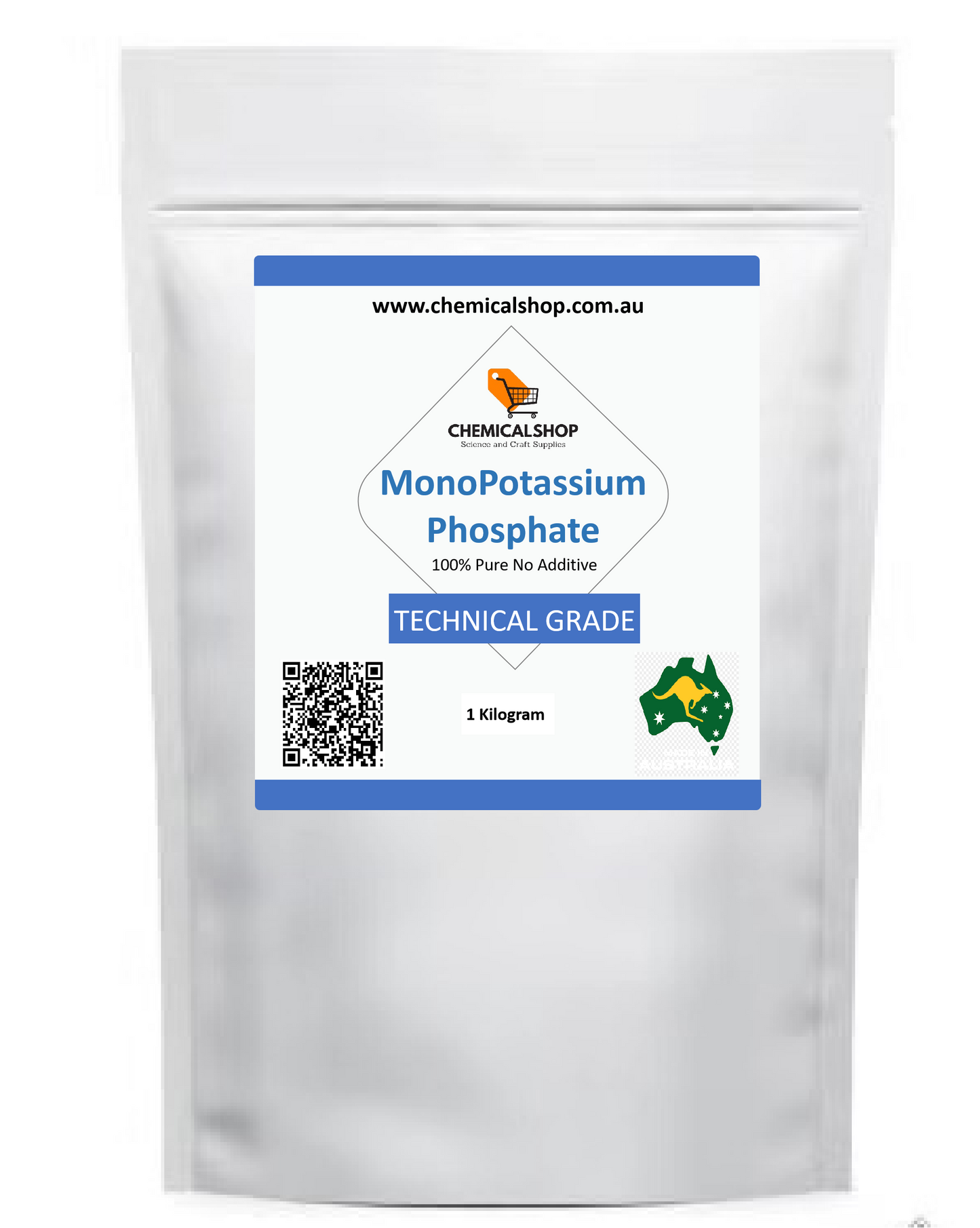AustralianChemicalShop
Monopotassium Phosphate
Monopotassium Phosphate
Couldn't load pickup availability
Product Name: Monopotassium Phosphate
Purity Grade: Technical Grade
CAS Number: 7778-77-0
Size: 0.2 mm in average
Appearance: clear crystal
Other Features: Hydrophilic
Monopotassium phosphate, also known as MKP or potassium dihydrogen phosphate, is a soluble salt that contains phosphorus (P) and potassium (K), two essential elements necessary for plant growth and development. Its chemical formula is KH2PO4, indicating its high concentration of potassium and phosphorus ions.
The Importance of Phosphorus and Potassium
Phosphorus is a fundamental component of DNA, RNA, and ATP – the "energy currency" of plants. It plays a critical role in photosynthesis, nutrient uptake, root development, and promoting overall plant vigor. Potassium, on the other hand, regulates water absorption, enzyme activation, protein synthesis, and overall plant health. Together, phosphorus and potassium ensure robust growth, improved resilience to stress, and greater yield.
The Benefits of Monopotassium Phosphate
- Enhanced Root Development: Monopotassium phosphate stimulates root growth, enabling plants to establish a strong foundation and absorb nutrients more efficiently.
- Improved Flowering and Fruiting: The high phosphorus content in MKP promotes abundant flower and fruit development, resulting in higher crop yields and more beautiful blooms.
- Increased Nutrient Uptake: With the help of monopotassium phosphate, plants can absorb and utilize other essential nutrients more effectively, ensuring their overall health and vitality.
- Enhanced Stress Tolerance: Phosphorus and potassium play crucial roles in strengthening plants' immune systems, making them more resilient to environmental stressors such as drought, disease, and pests.
- Increased Soil Fertility: MKP enriches the soil with essential minerals, contributing to its long-term fertility and promoting sustainable gardening practices.
How to Use Monopotassium Phosphate
Monopotassium phosphate can be used in various ways, depending on the specific needs of your plants. Here are some common applications:
- Foliar Spray: Dissolve a small amount (around one teaspoon per gallon of water) of monopotassium phosphate in water and spray it onto the leaves of your plants. This method provides rapid nutrient absorption and is particularly effective in treating nutrient deficiencies.
- Soil Application: Incorporate monopotassium phosphate into the soil before planting or mix it with water and apply it directly to the root zone. This method ensures gradual nutrient release, providing a sustained supply of phosphorus and potassium to the plants.
- Hydroponics: Monopotassium phosphate is widely used in hydroponic systems due to its excellent solubility. Follow the manufacturer's instructions for proper dosing and application methods.
Precautions and Tips for Using Monopotassium Phosphate
- Always wear protective gloves and goggles when handling monopotassium phosphate to avoid contact with eyes and skin.
- Follow the recommended dosage instructions provided by the manufacturer. Over-application can lead to nutrient imbalances and adversely impact plant health.
- Store monopotassium phosphate in a cool, dry place, away from direct sunlight and moisture, to prevent premature degradation.
- When using monopotassium phosphate in conjunction with other fertilizers, consider their nutrient content to avoid excessive phosphorus or potassium levels.

Chemical Shop
Chemical Shop customers' common questions
How long does it take for you to dispatch the paid item?
Chemicalshop dispatchs items within 2 business days. For order equivalent or over 100kg, it might take 5 business days to process.
Do you have a physical store?
Yes, our warehouse is at Factory 6, 18 Prospect Pl, Boronia, VIC. We ship order Australian wide.
Where do you source your product?
All chemicals are sourced from Europe and Australia. We only import highest quality chemicals from the reputable global manufacturers.

